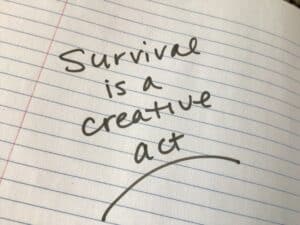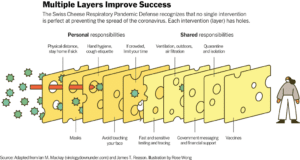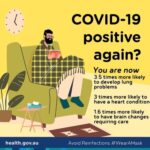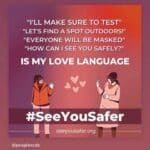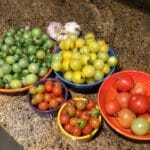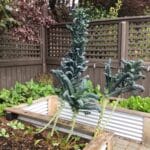Category Archives: First Person
In personal news….
Unfortunately, I am dealing with some critical health issues. If you’ve got prayers or good thoughts or good vibes to spare, send some my way. Meanwhile, may you be well, happy, and peaceful.
xo
J
Where I’m Finding Inspiration for the Year Ahead
December 30 always feels like a hyphen to me. A little gap. It is the space between the past year and the next. Traditionally, it is a day of reflection for me. I look for inspiration for the year ahead. Not resolutions. That’s not my thing. I’m looking for a bit of a North Star, if you will. Something to guide me in 2024.
Inspiration can come to me during meditation. But meditation doesn’t always help when I’m looking for what to DO. That’s because meditation is about being, not doing.
Often, I need more. When that happens, I’ll pull a word out of the little bag of words I keep. Or I’ll pull a tarot card and think about what it means in the context of whatever problem I face. Sometimes, I’ll play “Bingo” with any number of books I keep handy that offer brief inspirations and insights, which means I’ll open to one random page and see what it offers me.
Today, I looked up which saint has their feast day on December 30 and discovered Saint Roger of Cannae. This is a surprising thing for me, an ex-Catholic, to do. But inspiration can come from anywhere. According to Wikipedia, (which admits their page on Saint Roger is lacking detail) he was the Bishop of Cannae in a region of what is now southern Italy. The region was destroyed by Normans in 1083. Little is known about him. Even saintoftheday.com has little to go on. And my own little reference guide to saints, Saints: A Visual Guide does not even list him.
Saint Roger is sort of a forgotten saint, I guess. Little known. Known just enough. That appeals to me. Fame would be a burden, I think.
“Roger contributed to the moral and material reconstruction of the ancient city of Apulia, supporting his fellow citizens with the consolations of faith and the material aid” after it was destroyed, says Wikipedia. Saintoftheday.com writes that after Cannae was sacked, “Where some saw only destruction, Roger saw an opportunity to create an even more welcoming and compassionate community.”
Bingo. That’s exactly the kind of inspiration I’m looking for today.
When I think back to the beginning of 2020, I thought building a better community was the possibility that the pandemic offered us. It was horrible, yes, but it also showed us important things we could be better at. I remember that first week after planes stopped and cars stopped and everyone stayed home, I went for a very solitary and quiet walk down to Lake Ontario. The sky was SO BLUE. I hadn’t seen a sky like that since I was a kid. The pollution was clearing. I thought, “Oh! Look. Look how fast we could fix what ails us.” Sometime later, I stood in awe as a ten point buck walked in the forest along the Humber River. Where had he been all this time? I saw foxes. And turtles. And so many birds. In Toronto, a huge and sprawling city.
Sigh. I was so naive. I admit I have felt very bitter about the lost opportunity. I haven’t always taken it well. Like many of us, I’ve been adrift in conflicting emotion. The pandemic challenges our relationships as we negotiate our different responses. I feel let down by my fellow humans. As a person with serious health challenges, I often feel abandoned as the world goes “back to normal” and opportunities to participate more safely evaporate. Ableism is what makes my life harder, not mask wearing.
Anyway, although those hopes I had for a better world are mostly dashed, reading about Saint Roger, I felt a little jump with the words “create an even more welcoming and compassionate community.” I realize that is still the goal.
Fortunately, more opportunities are right in front of us. Climate change will test us even more than Covid. If Covid was the quiz, climate catastrophe is the final exam. It’s not one any of us can pass without each other’s help. We need a study group.* And, of course, the pandemic and climate are connected. Failure is almost certain, but how we fail matters.
I am not a patient person. And I am notoriously blunt. It puts people off. I’m going to try to do better. Oh dear. That sounds ominously like a resolution.
A more compassionate community is possible. Even if we are being sacked by the Normans. Whoever they were. I’ll keep Saint Roger with me in 2024.
*Subscribe and follow along with The Grim Reader posts, which is a kind of book club of one about all the climate change books I’m reading, and, I realize, a kind of study group too. Comments on posts are always welcome.
Survival is a Creative Act
I feel better today. Spiritually. Psychically. I attribute this to watching “American Symphony” with the incredible Jon Batiste. What he and his wife, Suleika Jaouad, share in this documentary is encapsulated by the line, “Survival is a creative act.”
I’m going to write that on post-it-notes and big banners and stick them all around my home because I have a lot to survive in 2024. I was not feeling good about it. Not too much optimism. And then this phrase pops up in my life exactly when I need it.
Batiste talks about how art finds its way to us when we need it in his speech at the Grammy Awards for best album in 2022. It’s magic. (As is the incredible coat he is wearing.) Sean Thomas Dougherty writes something like this in his poem, “Why Bother?” from his book The Second O of Sorrow. Why bother writing? “Because right now there is someone out there with a wound in the exact shape of your words.”
Survival is a creative act. I looked the phrase up. Ocean Vuong said it in an interview with the CBC. I didn’t look any further. The funny thing is, I’m pretty sure I read that interview before, but the phrase didn’t stick then like it does now. Now is when I need it. And like magic, it found its way to me again.
For a lot of my life, surviving was something I did “on the side.” Then I would rejoin my life in progress. Whatever difficult thing was happening always felt like an interruption. Now I realize it is the main event. It feels good to bring it front and centre. Jon Kabat-Zinn talks about this in his book Full Catastrophe Living. Life is the full catastrophe. Every day. I first read this book when I was about thirty. So I’ve known this for a long time. But it is with me now on a deeper level.
American Symphony mentions Suleika Jaouad’s bestselling book, Between Two Kingdoms: A Memoir of a Life Interrupted. Both Batiste and Jaouad are at peaks of creative success when Jaouad has a relapse of the leukemia she describes in her book. What strikes me is the subtitle of her book and the idea of “interruption.” To be clear, I have not read this book, although by all accounts it is excellent. (I don’t read cancer narratives anymore. They bring back too many bad memories.) But this idea that our lives are “interrupted” by illness and other problems we have to solve is one I reject now. Maybe Jaouad does too, but again, I haven’t read her book. If you’ve read it, let me know.
Survival is not a side-hustle. It’s not something we do until we can rejoin our regular life in progress. Our life is whatever is happening. Cancer. Failing hearts. The deaths of our parents, our friends, our dogs. Divorces. Floods and fires. War. Genocide (as victim or witness). A global pandemic. Climate catastrophe. And through it all, our survival is a creative act. It is our life’s work. And to survive while acting with grace and the golden rule at top of mind is a life well lived. This is something I know to be true.
For those following my heart story, I still don’t have a date for the big surgery, but I have reason to believe it will happen before the end of March. I’ll keep you posted. Meanwhile, whatever you are surviving at this very moment, it is a creative act. Honour it.
Oh My Heart—And Yours
I recently received inevitable bad news. Twentyish years ago, when I was treated for cancer, I had chemotherapy and radiation. Everyone thinks chemo is hard (and it is) but radiation is also a very big deal. Radiation affected my heart and lungs. I have worked hard over the years to keep my cardio strength up. But I can’t keep ahead of it anymore. Radiation has calcified my aortic heart valve. I will undergo open heart surgery in the spring to replace it.
(I’m begging you, please don’t send medical advice.)
I’m ok. I’ve always known this was a possibility. I plan on living through it. I’m grateful to all the people who gave me this last twenty years. I got to see my wonderful child grow up and become the most superb adult.
And let’s face it, when I’m given that long list of side-effects and asked if I understand, what I hear is “Do I want to die now or later?” My answer is always, “Later.” I have a feeling I’m about to sign off on another bunch of those.
I have things I say about this turn of events. “The chickens have come home to roost,” is one. When I’m feeling slightly bitter, I might say, “Cancer: the gift that keeps on giving.” And now, a new one via my friend Marnie, whose parter has had open heart surgery twice: “It sounds dramatic, but remember, for the surgeon, it’s their Tuesday morning.” Good perspective. Thanks for that, Marnie.
I will stay in the hospital for seven to ten days. There are a lot of things to worry about and contracting covid shouldn’t be one of them. Currently, there is a mask mandate for hospital workers in my jurisdiction, but who knows if it will still exist in the spring.
I honestly don’t know what kind of monster would visit a cardiac ICU without a mask on. Or any part of a hospital.
Can you imagine having that covid cough after your sternum has been cracked open? I can’t.
This is where you come in.
I hear people lamenting the state of the world. It is lamentable. They ask, “What can I do?” Whatever the issue is that you are lamenting, the answer is to take action. Action (hopefully informed action) fends off depression, for one thing. It’s great for that. It gives you a sense of control and gets you out of your own head, often because you are helping other people.
If you are concerned about the suffering and sickness all around you, the first and easiest action you can take to lessen it is to wear a mask. I’m going to say something harsh here. Get ready. If you are not willing to wear a mask, take a hard look at yourself. You really don’t care about the sickness and suffering all around you.
I cannot think of a situation that is not made worse by the pandemic and that would not be eased if SARS-C0V-2 were brought under control. Palestinians are getting covid while being bombed to near oblivion. But if genocide is your goal, covid is your helper. Climate disasters are made worse by people getting covid. Any illness or weakness you have lurking in your body is made worse by this vascular disease that can affect every organ in your body, including your brain. The decimation of your immune system means you will be sick more often. These are all known things. Get your head out of the sand and do some reading.
I’ve been wearing a mask since the beginning. It’s part of my life now. It is my normal. It is me, living with covid.
I am no longer willing to cut people with privilege and means any slack on this. If you are unaware of the criminal obfuscation going on around the airborne nature of this disease by public health and our so called leaders, it is because you don’t want to be aware of it. That’s on you. I wash my hands of you (knowing that hand-washing doesn’t do much to stop covid.) And if you are one of those public health people or alleged leaders, start doing your job. Start with distributing free masks. Then work on cleaning indoor air in public spaces you are responsible for.
I’ll still be active here. I’ll continue to talk about covid, about this new foray into the heart of me, and I’ll carry on with The Grim Reader. The pandemic and covid are conjoined twins of disaster. It’s important we keep trying our best.
And for those of you who will newly mask or mask again, thank you. For those who never stopped, thank you. We are all connected. We can’t ever forget that.
Gardening and Writing
Sometimes, gardening is better for me than writing. Both gardening and writing are creative, but gardening has a messiness and physicality that writing lacks. That’s what I need right now.
It’s mid-October and my garden is still producing. Red and green leaf lettuce, romaine, arugula, Swiss chard, kale, beets and a few cucumbers that are trying really hard to become something bigger. The lacinato kale has been growing all year and currently looks like it belongs in a Dr. Seuss illustration. I’ve harvested the last of the cherry tomatoes and a few matinas that are ripening on the counter. I’m busy roasting them and with the help of my little freezer, I will be able to enjoy them through the winter when store-bought tomatoes are always a disappointment.
My carrots have always failed. I’m going to try again next year. Why not? The garden is an ongoing experiment. I’m not trying anything exotic. But the joy I get seeing a ripe strawberry and getting to it before the raccoons can’t be beat. I make decisions with the plants. I have to observe closely. The tomatoes have “told” me where they want to be next year. They don’t want to be clumped together. They want to be scattered throughout the beds where they can get more sun. I’ve jotted their wishes down in my garden notes for the spring.
Garlic goes in this week. Russian red. I grew it last year and it came up beautifully. It’s mild and delicious and when I see my garlic braid hanging by the back door, I feel a sense of accomplishment.
Gardening whispers to me: grow.


